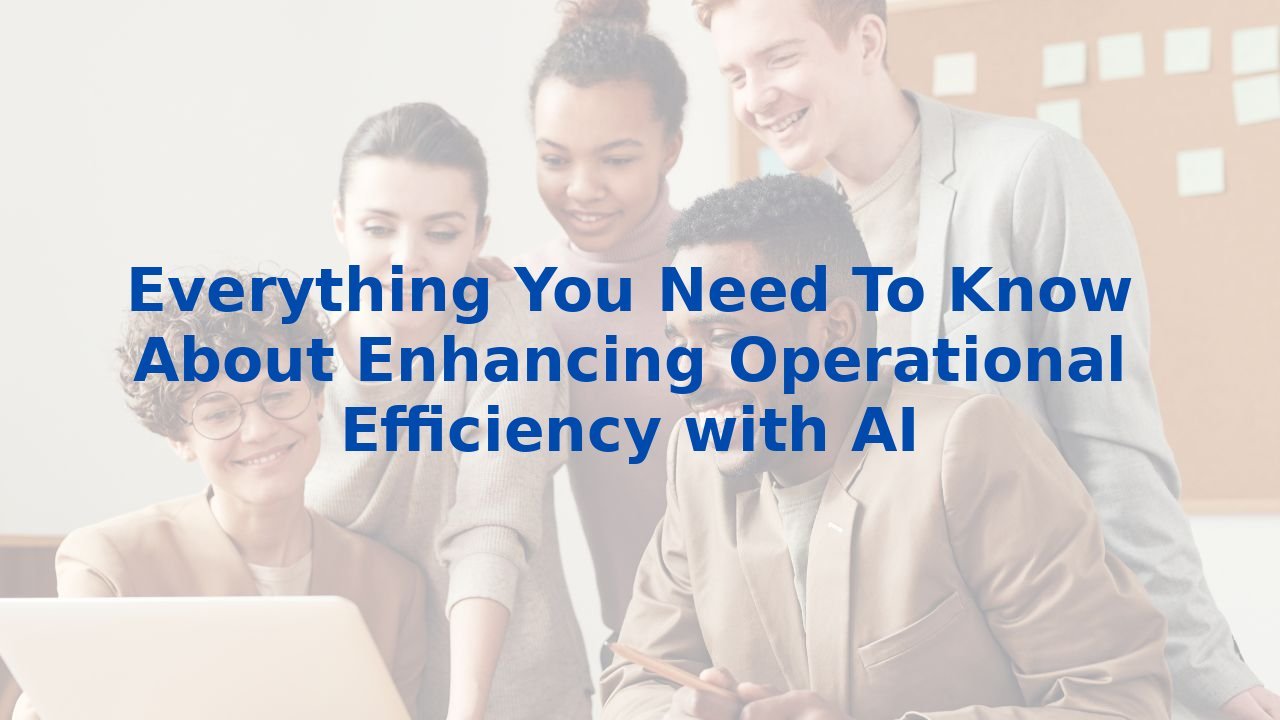Everything You Need To Know About Enhancing Operational Efficiency with AI
Everything You Need To Know About Enhancing Operational Efficiency with AI
In the contemporary business landscape, the pursuit of operational efficiency is non-negotiable. Organizations must evolve and adapt, not just to survive, but to thrive in an environment rife with competition and rapid change. Enter artificial intelligence (AI)—a transformative force poised to redefine how businesses operate. This comprehensive guide demystifies the integration of AI into general business processes, illustrating how it can significantly bolster efficiency and drive tangible results.
1. Automation of Routine Tasks
AI shines brightest in automating routine and repetitive tasks that often bog down employees. Functions such as data entry, invoice processing, and appointment scheduling can be remarkably streamlined through AI-driven software. By harnessing the power of intelligent automation, organizations not only reduce human error but also accelerate workflows. This transformation empowers employees to redirect their attention to more strategic, high-impact projects, breathing new life into innovation and creativity.
2. Data Analysis and Insights
The modern business world generates a staggering amount of data, making it challenging for human analysts to extract meaningful insights. AI excels in this realm by leveraging sophisticated algorithms to sift through heaps of information with lightning speed and unerring precision. The rich insights gleaned from such analysis provide businesses with a competitive advantage, allowing them to make informed decisions, craft tailored marketing strategies, and adapt to fluid market dynamics effectively.
3. Personalized Customer Experience
AI’s capability to analyze extensive datasets empowers companies to craft a personalized customer experience like never before. By understanding consumer preferences, purchase histories, and browsing behaviors, organizations can curate highly targeted products and marketing messages. This level of personalization not only enhances customer satisfaction but also cultivates loyal, engaged relationships that drive long-term success.
4. Predictive Analytics
Moving beyond traditional analytics, AI introduces predictive capabilities that can forecast future trends and behaviors based on historical data. Organizations can leverage this foresight for demand forecasting, optimizing inventory management, and anticipating crucial maintenance needs. Ultimately, this approach minimizes operational inefficiencies, reduces costs, and ensures resources are allocated most effectively across the enterprise.
5. Real-Time Data Analysis
In an era where agility is paramount, AI facilitates real-time data analysis, equipping businesses with instantaneous insights into operations. This capability is invaluable for informed decision-making, enabling companies to respond with agility to emerging conditions or opportunities. Real-time analytics also play a crucial role in proactive issue identification, allowing potential disruptions to be addressed before they escalate.
6. Cost Reduction and Resource Optimization
Implementing AI translates to substantial cost reductions through process automation, waste minimization, and resource optimization. With AI driving operational efficiency, organizations can achieve more with fewer resources—a key factor for sustainable growth and profitability. Additionally, AI-enhanced data analysis optimizes how resources, whether human, financial, or material, are allocated, leading to improved performance across various departments.
7. Enhanced Decision-Making
AI arms decision-makers with valuable insights derived from sophisticated data analysis. A data-driven decision-making process ensures that choices made are rooted in objective information rather than subjective instinct, significantly augmenting the likelihood of success. By utilizing advanced technologies such as machine learning and natural language processing, businesses can navigate complexities with increased accuracy and confidence.
8. Scalability and Adaptability
AI solutions are inherently scalable and can adapt readily to an organization’s evolving needs. Whether facing growth or the necessity for operational pivots, AI technologies can accommodate varying workloads and challenges. This resilience positions companies to swiftly respond to shifts in the market landscape, technological advancements, and regulatory requirements, safeguarding organizational vitality and relevance.
The Benefits of Training Employees for AI
While AI presents a myriad of operational benefits, it’s vital to equip employees with the skills necessary to thrive alongside these systems. Training employees in AI usage fosters deeper understanding and engagement, leading to significant advantages:
- Understanding AI Systems: Training helps employees comprehend the architecture of AI systems, enhancing their ability to utilize the technology effectively.
- Enhanced Collaboration: Familiarity with AI tools fosters collaboration, leading to improved workflows and more reliable decision-making.
- Adaptability: Trained employees can swiftly adjust to new AI tools, ensuring smoother integrations into existing processes.
- Improved Decision-Making: Insights derived from AI can inform better decisions, aligning choices with overarching organizational objectives.
Conclusion
Integrating AI into operational processes opens the door to a host of benefits, ranging from enhanced efficiency and cost-effectiveness to superior decision-making and heightened customer satisfaction. By automating mundane tasks, analyzing extensive datasets, delivering personalized customer experiences, and optimizing resources, AI empowers enterprises to transcend traditional operational paradigms. Moreover, investing in employee training ensures that organizations can harness AI’s full potential—transforming not just the tools they use, but the very fabric of their operations. As businesses embrace the monumental advantages of AI, they set the stage for a future characterized by intelligent automation and operational excellence.



